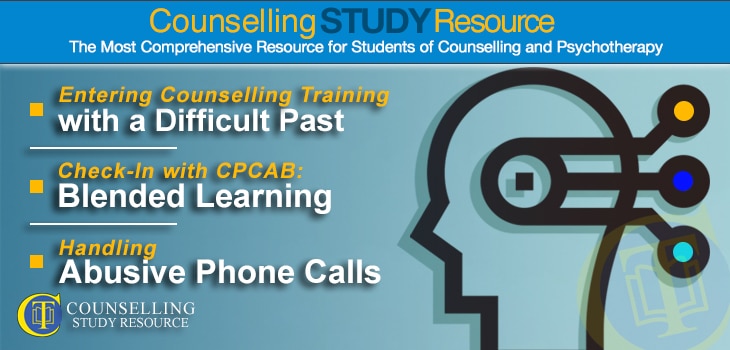155 – Blended Learning in Counselling Training
Entering Counselling Training with a Difficult Past – Handling Abusive Phone Calls
In episode 155 of the Counselling Tutor Podcast, Ken Kelly and Rory Lees-Oakes give some tips on the feasibility of entering counselling training if you have a difficult past. ‘Check-In with CPCAB’ then looks at the development of blended learning in the field of counselling and psychotherapy. Finally, in ‘Practice Matters’, the presenters discuss how to handle abusive phone calls.
Entering Counselling Training with a Difficult Past (starts at 1.45 mins)
Can you become a counsellor if you have had a difficult past yourself? This question is asked frequently in the Counselling Tutor Facebook group.
The answer is most definitely yes – but with the proviso that you need to have processed your emotions relating to this to a reasonable extent before entering counselling training.
Some people come along to counselling training as a substitute for having therapy themselves but – given the highly emotional nature of the counselling journey – they could quickly become overwhelmed.
It’s always a good idea to be honest with the tutor on a course you are applying for if you are aware of particular difficulties you have experienced: if you try to keep these to yourself, they will be bound to come out at some point during training, so it’s much better to have been up-front about these from the start.
Do remember that tutors want students to join and succeed, but they also want you – and your future clients – to be safe, so they may suggest that you wait and perhaps receive some therapy yourself in order to process your own emotions more thoroughly before joining a course.
In short, don’t be put off counselling training by your past difficulties, but don’t rush into it either. It is important that the time is right.
While counselling training does indeed offer lots of opportunity for personal development, you will need a certain amount of emotional resilience and robustness to get through.
Rory has written a handout based on his own experience (as a counselling tutor) of possible types of difficulties and how best to approach entering counselling training with these. You can access this here, or through the Counselling Study Resource (CSR).
Don’t be put off counselling training by your past difficulties, but don’t rush into it either. It is important that the time is right.
Check-In with CPCAB: Blended Learning in Counselling Training (starts at 14.00 mins)
Rory talks to Molly Ayre (Counselling Qualification Professional) at CPCAB (Counselling & Psychotherapy Central Awarding Body) about the likely growth in blended learning in counselling training.
The current COVID-19 situation has led to colleges having to shift quickly from face-to-face to online teaching.
With the likely ongoing need for social distancing, training providers are increasing looking at delivery options that do not rely completely on students all coming together in the physical classroom – in other words, blended learning (using a mixture of in-person and remote learning).
Given that online counselling is likely to have experienced huge growth in this time, with many agencies seeing the benefits to clients, it will be very valuable experience for students to become more familiar with online technologies, and to experience remote working for themselves.
This segment is sponsored by CPCAB, the UK’s only awarding body run by counsellors for counsellors. You can find out more about CPCAB and blended learning in counselling training on its website.
Handling Abusive Phone Calls (starts at 26.55 mins)
In this part of the Counselling Tutor Podcast – aimed at supporting qualified practitioners to sharpen their competence – Rory and Ken talk about handling abusive phone calls.
While these are not common, they are an inevitable part of working in a public-facing profession. It can be hard to act rationally in the heat of the moment when faced with such calls if you have not thought through and planned how you would deal with them.
Ken and Rory provide the following tips to help you respond professionally:
- Try not to jump to conclusions that the caller is not being genuine – is it possible that they have a real difficulty and are subject to the disinhibition effect brought about by speaking on the phone?
- As soon as you realise that it is not counselling that a caller wants, avoid responding politely and get off the phone.
- Seek support from your supervisor.
- Do report the call to the police if this feels appropriate.
- Try not to worry too much about the caller posing a physical risk to you (e.g. stalking you or appearing at your premises): such callers are rarely a real-life risk to those they contact.
Free Handout Download
Training with a Difficult Past
